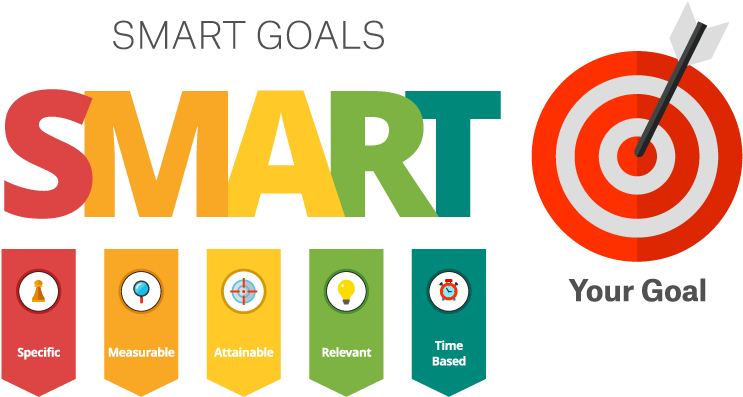When you ask most kids what their goal is for the school year, they say to get “good grades”. Well…yes… that would be a great goal, however, we need something a little more concrete and achievable for them. Getting good grades isn’t just a switch that we can turn on and off (as great as that would be). That is why it is important to set measurable, realistic and attainable goals. Instead of saying, “I am going to get good grades” or “I am going to get straight As”, we need to start focusing on SMART goals. Setting goals is an important skill that needs to be explicitly taught to children.
When we have SMART goals in place, students will work harder to reach those goals. According to Locke and Latham’s goal setting theory, the more difficult and specific a goal is, the more determined people are to achieve it. For example, they found that 90% of the time, specific and challenging goals led to higher performance in their study. The important thing to note is that the word does not mean unattainable. It means that hard work is required, but achieving the goal is realistic. This is where SMART goals come in.
SMART goals are an acronym for:
S – specific – the goal is clear, concise and practical
M – measurable – it is something that the student can track and reflect on
A – achievable – the goal is within reach – through some effort, the student can reach their goal
R – realistic – it is doable – the student can reach their goal
T – timely – by adding a date, time, etc. to it, it adds more accountability
Some example goals include:
I will __________________ by ______________ so __________________.
- I will read 5 nights a week for 15 minutes until the end of June so I can get better at reading.
- Is this measurable? Yes
- Is the achievable? Yes
- Is this realistic? Yes
- I will join the join homework club in September so I can get extra support and finish my homework.
- Is this measurable? Yes
- Is the achievable? Yes
- Is this realistic? Yes
- I will ask my teacher for help when I don’t understand the question by raising my hand in class so I can understand better.
- Is this measurable? Kind of
- Is the achievable? Yes
- Is this realistic? Yes
Setting goals is an important way for students to gain independence and gain responsibility and accountability. Over 1000 studies have shown that goals are more effective when they are both meaningful (Morisano, 2013). By using the SMART goal method, we can help students to create meaningful goals for the year and in turn, teach them a valuable life lesson.
References
Morrison, D. (2013). Goal setting in the academic arena. Goal Setting in the Academic Arena, 495–506. https://www.researchgate.net/profile/Dominique-Morisano/publication/256374704_Morisano_D_2013_Goal_setting_in_the_academic_arena_In_E_A_Locke_G_Latham_Eds_New_Developments_in_Goal_Setting_and_Task_Performance_pp_495-506_NY_Routledge/links/59dd2b7d458515f6efef2900/Morisano-D-2013-Goal-setting-in-the-academic-arena-In-E-A-Locke-G-Latham-Eds-New-Developments-in-Goal-Setting-and-Task-Performance-pp-495-506-NY-Routledge.pdf
Locke, E. A., Shaw, K. N., Saari, L. M., & Latham, G. P. (1981). Goal setting and task performance: 1969–1980. Psychological Bulletin, 90(1), 125–152. https://psycnet.apa.org/record/1981-27276-001









